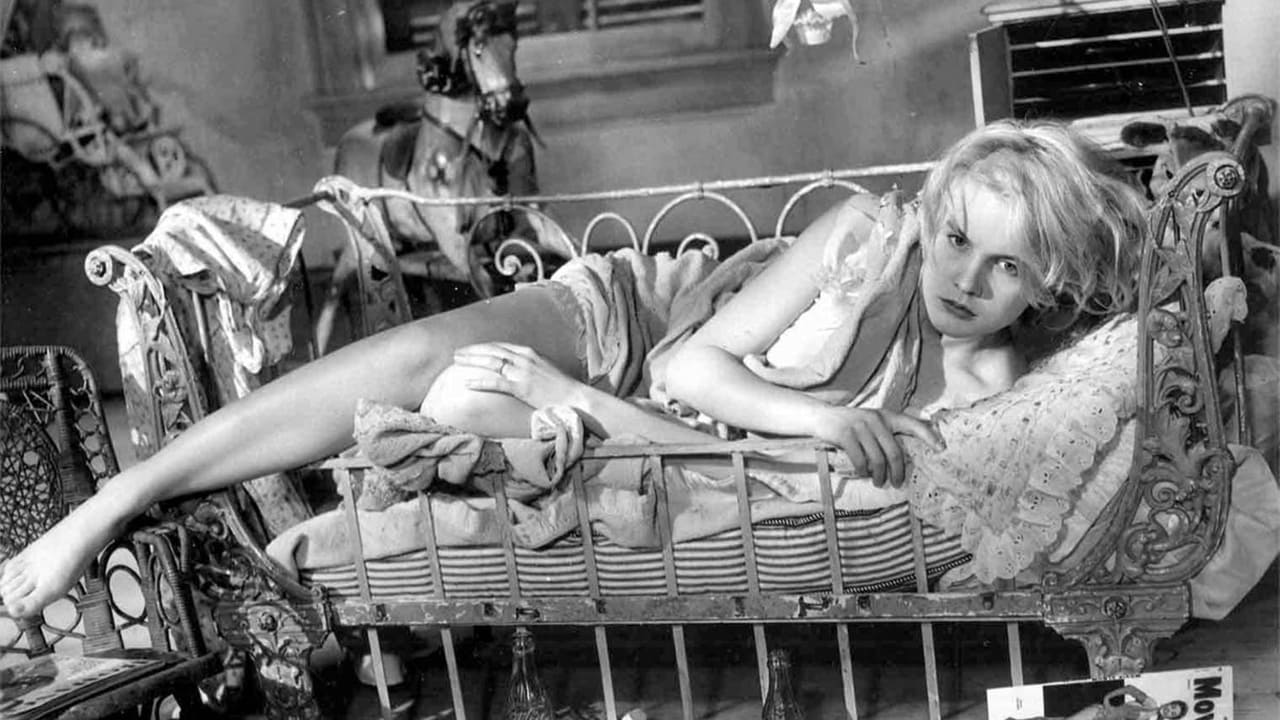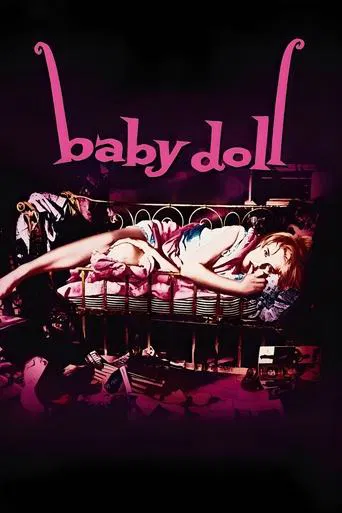

Well if this wasn't Eli Wallach's favorite film role I would sure like to know what was. His scenes with Carroll Baker as the Baby Doll of the title were so full of innuendo and steamy desire that as the viewer you simply can't turn away. It's probably no coincidence that the story had it's setting in the sleepy cotton valley of Tiger Tail County. Tiger Tail indeed.I'm curious how Karl Malden managed to land roles like the one he has here as Archie Lee Meighan. He certainly wasn't handsome, so the leading man spot he was sometimes cast in certainly wasn't based on looks. A couple years earlier he portrayed a somewhat mad scientist type who got kind of spooky when he turned on the girl who jilted him in "Phantom of the Rue Morgue". Malden had that same kind of creepy vibe going for him here, especially when he first introduced Baby Doll to Silva Vacarro (Wallach). It's surprising that Vacarro and Archie didn't come to blows in the story with all that went on, that would have been something to see.The unheralded character in all of this has to be Aunt Rose Comfort (Mildred Dunnock). She didn't have much to say but she did it so comically I had to laugh, what with the chocolate candy business at the hospital and all. There was one scene in which she wore a hat and darn if she didn't resemble Harpo Marx. I guess she never did go to work for Silva Vacarro.If you haven't seen the movie before I think you'll probably be mesmerized as I was with the sheer audacity of it all. The middle part of the movie may seem rather slow when Wallach and Baker dominate the screen, but I think that's intensified by one's anticipation for something, anything to happen between the characters. Eventually it does, but not in ways one might expect. You'll just have to see it for yourself.
... View MoreBaby Doll is a really talky Elia Kazan film based on a play by Tenessee Williams. Two cotton gin farmer rivals clash when one of them (Karl Malden) burns down the others (Eli Wallach) cotton gin. The Italian cotton gin farmer (Wallach) tries to seduce Malden's garrulous young wife.The film is divided into two sections divided by the arson incident. The first section involves the relationship between the impotent Malden and his frustrated young wife played by Carrol Baker. The second section involves the seduction of Baker by the devious but charming Wallach.Like i said the film is very talky, with the three characters running circles around each other. It does reflect the attitudes of rural Americans who are portrayed as extremely bigoted.I did not find the film to be overtly sexy. In fact, Baker came across as too tame. the locations and the house where the incidents take place are very nice to look at.But there is a play like quality to the film. The talkiness did get on my nerves after a certain point. But Eli Wallach was simply sensational. I guess he was the Joe Pesci of the 50s and 60s. Really tough actor with a sharp and sprightly dialog delivery.(7/10)
... View MoreThis is what Karl Marx said about history repeating itself in his 1852 essay, "The Eighteenth Brumaire of Louis Bonaparte." "Brumaire" is the second month of the French Republican calendar and refers to fog. I think the same concept can be applied to Baby Doll in relation to the 1953 movie that Tennessee Williams also wrote and Elia Kazan also directed, A Streetcar Named Desire. In Streetcar, we grow to identify with and even love the characters played by Vivian Leigh and Marlon Brando. In Baby Doll we are more likely to hold the protagonists in contempt.This does not mean that Baby Doll is badly written, directed, or acted. It is just too much. Everything is extreme and exaggerated. It's hard to take seriously and sometimes appears as grotesque comedy. Yet Williams was intimately familiar with the American South. Maybe farce was a valid way to see it in 1955.
... View MoreI first saw this film in the late 1960's at one of the great lower Manhattan revival art houses. They were a great place to get an education in cinema, usually showing a double feature for about $2. I must have been about 16 and I thought this film was about the sexiest I had ever seen. I immediately fell in love with Carroll Baker.Seeing it again more than 40 years later, it has lost some of its eroticism, but now I can appreciate Ms. Baker's terrific performance. (I was really surprised when I looked up her age and found that she was really 25 at the time and not 19 as she looks in the movie). In fact, all the main actors, Eli Wallach, Karl Malden and Mildred Dunnock are all wonderful in it.In the 1930's, there were a bunch of screwball comedies usually involving a wealthy man or his son falling in love with a young woman and interacting with her family of offbeat characters (e.g. "You can't take it with you."). Here Williams takes the formula but integrates it into his usual Southern environment and adds healthy douses of talk about sex and seduction. Only the wealthy man (Silva Varcarro) hasn't fallen in love with the young woman, he is just trying to seduce Baby Doll to get revenge for her husband (Archie Lee) setting fire to his cotton gin.The fact that Vacarro is Italian and an outsider in the good old boy community means that he can't get justice through the normal legal channels. He has to seek his revenge through the seduction of Archie Lee's young wife.Archie Lee is both disgusting and pitiable as a Southern aristocrat trying to prove his superiority and breeding, while his financed furniture is being repossessed, his gin mill machinery is broken down, and his wife refuses to let him consummate her marriage. If the film were remade today, I think that in order to enhance the satire and stay true to the spirit of the piece, instead of an Italian suitor, the role would have to be played by a black man. Of course, in 1956, the racists in the South still had enough power to prevent any such movie from even being considered.It is a little ironic that the Klan didn't protest the movie and shut it down because of its wicked satire on Southern well-bred gentlemen and virgin South bells, that was left to Cardinal Spellman and his gang of sexually repressed hypocrites in New York.
... View More